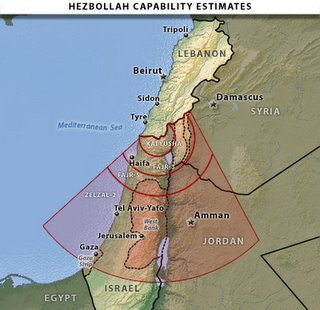Wednesday, July 19, 2006
Israel's Imperfect Options - Stratfor Special Report

We have been following developments in the Israeli-Hezbollah conflict closely for several days. At this writing, the air-rocket war continues to rage, but the Israeli ground offensive that we would have expected by now has not yet been launched. There is some speculation that it will not be launched -- that a combination of air operations and a diplomatic process will be sufficient, from Israel's point of view, to negate the need for a ground attack.
While the various processes grind their way along, it is time to review the situation.
The first point to bear in mind is that the crisis did not truly begin with the capture of two Israeli soldiers by Hezbollah. The kidnappings presented a serious problem for Israel, but could not, by themselves, define the geopolitical issue. That definition came when Hezbollah rockets struck Haifa, Israel's third-largest city, on July 13. There were also claims coming from Hezbollah, and confirmed by Israeli officials, that Hezbollah had missiles available that could reach Tel Aviv. Israel's population is concentrated in the Tel Aviv-Jerusalem corridor and in the Tel Aviv-Haifa corridor. In effect, Hezbollah had attained the ability to strike at the Israeli heartland. Hezbollah has been hitting the northern part of this heartland, as well as pounding Israel's northern frontier.
The capture of two soldiers posed a symbolic challenge to Israel, but the rocket attacks posed a direct geopolitical threat. Israel had substantial room for maneuver regarding the captured troops. The threat to the heartland, however, could not be evaded. To the extent possible, Israel had to stop the missile attacks. As important, it also had to eliminate Hezbollah's ability to resume such attacks. The Israelis can tolerate these strikes for a certain period of time, so long as the outcome is a final cessation. What was not an option for Israel was to engage in temporary solutions that would allow Hezbollah to attack the heartland regularly, at its discretion. Hezbollah has posed a problem that Israel cannot choose to ignore.
Israel's Imperfect Options
Israel has three tools at its disposal.
One is diplomacy. There is a general consensus, even among many in Lebanon and Arab countries such as Saudi Arabia, that Hezbollah's actions have been unreasonable and undesirable. It would not be too difficult, we would think, to create a circumstance in which the two Israeli soldiers are released, a cease-fire is declared and an international monitoring team inserted into the region. That is what the French, for example, have proposed, and what is being discussed now.
The problem with this option, from the Israeli point of view, is that it puts off a solution to the deeper problem posed by Hezbollah to a later day -- one that might not be so advantageous for Israel. Israel has a built-in distrust of international peacekeeping operations -- dating back to May 1967, when the United Nations, without consulting Israel, withdrew peacekeepers from Sinai at the behest of the Egyptians. This cultural bias against peacekeepers is reinforced by the fact that Hezbollah could rearm itself behind the peacekeeping shield. Whether the peacekeepers would conduct operations to prevent this -- in effect, carrying out counterinsurgency operations in Lebanon in support of Israel's goals -- is doubtful in the extreme. Instead, the presence of a peacekeeping force might facilitate a more substantial Hezbollah capability down the road. This is, at least, how the Israelis think of it, and their position therefore has been consistent: The outcome of this conflict must be the destruction of Hezbollah, or at least its offensive capability, for an extended period of time.
That leads to Israel's other two options, both of which would be carried out with military force.
The first step has been the Israeli air campaign. All modern military operations by advanced powers begin with air campaigns. Their purpose is to prepare the battlefield for land attack and, in some cases, to force a political settlement. In Kosovo, for example, air attacks alone were sufficient to convince the Yugoslav government to concede its control over Kosovo. In the case of Desert Storm, the air campaign came in preparation for a ground attack.
Air forces around the world like to make extravagant claims as to what air power can do; the Israeli air force is no exception. However, while an air campaign can severely hamper Hezbollah -- particularly by attacking launch sites and storage facilities, and generally making launches difficult -- the likelihood that air power can, by itself, eliminate the threat is unlikely.
To reiterate a key point, the nature of the threat is continual attacks on Israel's geopolitical heartland. Now, it is possible that Israeli air operations could force some sort of political settlement, but again, as with the diplomatic option, it is difficult to conceive of a political settlement that guarantees what Israel wants. Even a Hezbollah withdrawal from southern Lebanon, coupled with occupation of the area by the Lebanese army, does not solve the problem. This solution assumes that the Lebanese army has the will and ability to prevent Hezbollah's return. For this to work, the Lebanese army would have to agree to dismantle Hezbollah's infrastructure, and Hezbollah would have to agree to let them do so -- and Israel would have to place its faith in both Hezbollah and the Lebanese army and government. It is difficult to imagine a situation in which the Israelis can reach a satisfactory political settlement. The air campaign as a political tool suffers from the same defect as the diplomatic track: It is of value only if Israel is prepared to accept a solution that does not guarantee a complete end to the threat posed by Hezbollah -- and potentially might leave the Israelis in a worse position, militarily, down the road.
There is an additional political fact and problem. Obviously, any threat to a heartland generates a unique political response. In Israel, the Olmert government is heir to Ariel Sharon's quest for an imposed political settlement on the Palestinians. This is a strategy opposed from the right, by Benjamin Netanyahu of Likud, who argues that any settlement that leaves military options in the hands of the Palestinians is unsustainable. The Hezbollah issue is the Palestinian issue on steroids. If Olmert were to agree to any settlement that does not include dismantling Hezbollah's capabilities or that relies on a third party to police that dismantling, Netanyahu would attack hard -- and we suspect that enough of Olmert's coalition would defect to force a political crisis in Israel.There has been no attack from Netanyahu, however.
The Logic for a Ground Offensive
From this, we must conclude that the air campaign comes in preparation for what is Israel's third option: a ground offensive. If Israel's goal is the destruction of Hezbollah's ability to strike the Israeli heartland for an extended period of time, the only way to hope to achieve this is from the ground. Those conducting air operations can see only what can be seen from the air. And even if they can hit whatever they see, eliminating the threat requires a ground presence. Therefore, we continue to believe that logic and evidence argue for an Israeli invasion of southern Lebanon -- and that any possible diplomatic or political resolution, however tempting, ultimately could not satisfy Israel's security requirements.
When we say invasion, we do not mean occupation. Israel has had its fill of counterinsurgency operations in Lebanon. This would be a raid in force. A large force would push into Lebanon, with two missions: the destruction of Hezbollah as an army and the location and destruction of all heavy weaponry. This solution would not be permanent, but it would achieve two ends. First, it would mean that for Hezbollah or a successor organization to regroup would take years. Second, it would leave no third party shielding Hezbollah while it regrouped. This strategy gives Israel what it wants now and options in the future.
Three more Israeli battalions were mobilized today. The United States, which certainly knows Israel's intentions, is now extracting U.S. citizens from Beirut. Israeli aircraft are working over Hezbollah positions in the Bekaa Valley. The United States, Israel's patron, is clearly in favor of the destruction of Hezbollah and there is no broad-based opposition to an Israeli offensive internationally. It is a window of opportunity that Israel will not pass up. The very thing that makes diplomatic solutions possible also makes invasion, for the Israelis, attractive.
Our analysis therefore runs as follows:
1. Only an invasion on the ground can provide Israel with the solution it wants to the threat Hezbollah has posed.
2. A diplomatic or political settlement not only cannot guarantee this outcome, but it would make later Israeli responses to Hezbollah even more difficult. Israel has more room for maneuver internationally now than it will have later.
3. The internal politics of Israel will make it very difficult for Olmert to come out of this with a less-than-definitive outcome.
4. Israel will seek to deal with Hezbollah without undertaking counterinsurgency operations in the long term. This means attack, sterilization of the threat, and withdrawal.
There has been much speculation about diplomatic solutions, the possibility that there will not be an invasion, and so on. But when we ignore the rhetoric and look at the chessboard, it is difficult to see how this conflict ends without some action on the ground. When we examine the behavior of the Israelis, they are taking the steps that would be needed for an invasion. Obviously we could be wrong, and clearly the invasion has not come at the earliest possible moment, as we had predicted. Nevertheless, when we step through the logic, we keep coming out with the same answer: invasion.
Send questions or comments on this article to analysis@stratfor.com.
For some reason I cannot get your entire page to load. I've tried three seperate times with no success. I can't see any of your sidebar, just so you know.
Regarding this post, I agree completely with the analysis and reached those conclusions on my own. It is - after all - only a matter of common sense! I am also glad that President Bush isn't encouraging Israel to cease fire! I actually think we should be helping Israel instead of simply sitting on the sidelines cheering them on.
Great article. Thanks!
Post a Comment
Regarding this post, I agree completely with the analysis and reached those conclusions on my own. It is - after all - only a matter of common sense! I am also glad that President Bush isn't encouraging Israel to cease fire! I actually think we should be helping Israel instead of simply sitting on the sidelines cheering them on.
Great article. Thanks!
<< Home

























